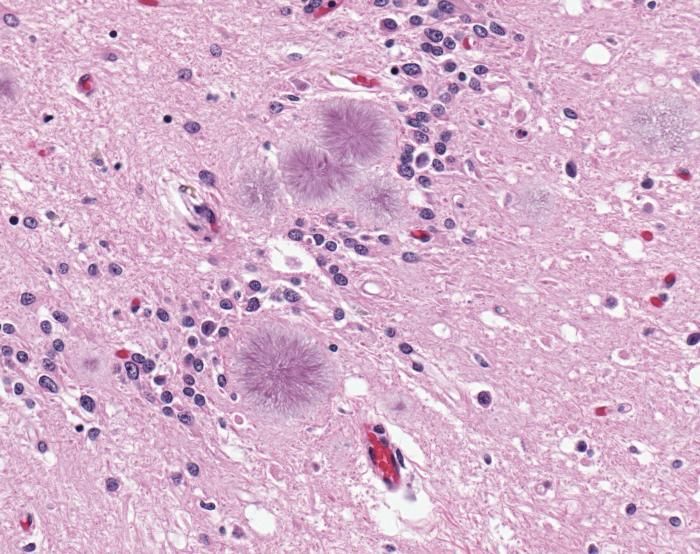Another Fatal Brain Disease May Come from the Spread of 'Prion' Proteins

A rare and fatal brain disorder called multiple system atrophy (MSA) may be caused by a newly discovered prion, a protein similar to the ones that cause mad cow and Creutzfeldt-Jakob disease (CJD), according to a new study.
The findings may set the stage for new treatments for MSA, a progressive disorder that causes symptoms similar to Parkinson's disease and has no cure.
What's more, the researchers say that the prion they believe causes MSA, called alpha-synuclein, is the first new prion to be discovered in half a century. Prions are infectious proteins that fold abnormally and trigger the misfolding of other, similar proteins. Eventually, the buildup of misfolded proteins can cause lesions to form in the brain, leading to disease.
"Based on these findings, we conclude that MSA is a prion disorder, and that alpha-synuclein is the first new bona fide prion to be discovered, to our knowledge, in the last 50 years," the researchers, from the University of California, San Francisco, wrote in the Aug. 31 issue of the journal Proceedings of the National Academy of Sciences.
Because prion diseases can be transmitted through certain types of contact with infected tissue, the findings suggest a potential concern for doctors and researchers who work with tissue from MSA patients, the researchers said. [10 Things You Didn't Know About the Brain]
A new prion
Patients with MSA can experience tremors, slowness in their movements, impaired speech and problems with coordination. The condition can lead to death within five to 10 years. The disease is rare: About three out of 100,000 Americans over age 50 are diagnosed with MSA yearly. Studies show that patients have a buildup of the alpha-synuclein protein in certain brain cells.
Sign up for the Live Science daily newsletter now
Get the world’s most fascinating discoveries delivered straight to your inbox.
In the new study, the researchers took brain tissue from 14 patients with MSA, and injected that material into mice that had been genetically engineered to have a mutation in the alpha-synuclein gene. The researchers found that the injections caused the mice to develop progressive neurological disease within about four months, suggesting that the scientists had been able to "transmit" MSA to the mice.
"We conclude that MSA is a transmissible human neurodegenerative disease caused by alpha-synuclein prions," the researchers said.
Other prion disorders, such as CJD, can be transmitted under rare circumstances, for example, when instruments used during brain surgery are cleaned without using certain methods. This is because traditional disinfection methods don't work to get rid of prions.
Although it's not clear if MSA could also be transmitted this way, the researchers said that doctors and scientists should adopt more-stringent safety protocols when working with tissue from MSA patients, and even other similar diseases, such as Parkinson's.
"We do not yet know whether or not MSA prions exhibit the same ability to stick to surgical instruments," like prions from CJD patients do, said study researcher Amanda Woerman, a postdoctoral fellow at the University of California, San Francisco. "Until we have those answers, we encourage a cautious approach to sterilizing instruments used on MSA patients to minimize potential public health concerns."
Caution on findings
However, some experts say that, by some definitions, alpha-synuclein is not a prion, and that there is no evidence that MSA spreads in the way that other prion diseases do.
Dr. Valerie Sim, of the Centre for Prions and Protein Folding Diseases at the University of Alberta in Canada, said that the traditional definition of a prion is an infectious protein that can transmit disease to another host. But based on the new study, alpha-synuclein does not meet this definition, because brain tissue from MSA patients did not cause disease in normal mice. Rather, brain tissue from MSA patients caused disease only in mice that were genetically engineered to have a mutant alpha-synuclein protein. (In contrast, "true" prions can cause disease in normal mice, Sim said.)
"The problem with branding something a prion is it induces fear, because people have heard of it as a scary transmissible disease," Sim said. But the new study, "if anything, shows [MSA] is not easily transmissible," she said.
Still, the new findings are important to consider in research and treatment of MSA, she said. But "we can't start a panic, because there's no actual evidence that human-to-human MSA transmission happens or can happen," Sim said.
Live Science contributor Christoper Wanjek contributed reporting to this story.
Follow Rachael Rettner @RachaelRettner. Follow Live Science @livescience, Facebook & Google+. Original article on Live Science.

Rachael is a Live Science contributor, and was a former channel editor and senior writer for Live Science between 2010 and 2022. She has a master's degree in journalism from New York University's Science, Health and Environmental Reporting Program. She also holds a B.S. in molecular biology and an M.S. in biology from the University of California, San Diego. Her work has appeared in Scienceline, The Washington Post and Scientific American.











